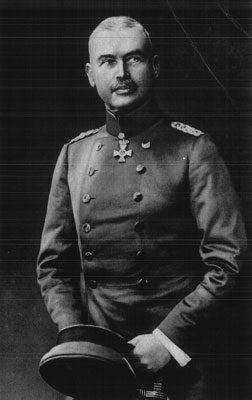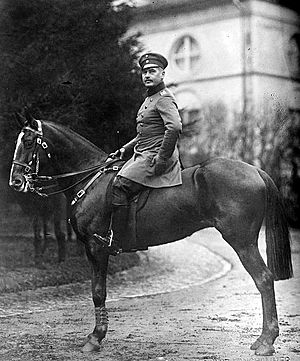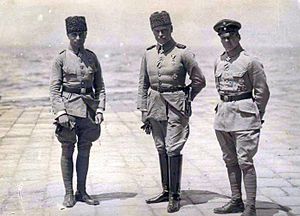Otto Liman von Sanders facts for kids
Quick facts for kids
Dr. phil. h. c.
Otto Liman von Sanders
|
|
|---|---|
 |
|
| Birth name | Otto Viktor Karl Liman |
| Born | 17 February 1855 Stolp, Pomerania, Kingdom of Prussia (now Słupsk, Poland) |
| Died | 22 August 1929 (aged 74) Munich, Bavaria, Weimar Republic |
| Buried |
Darmstadt, Germany
|
| Allegiance | |
| Service/ |
German Army Ottoman Army |
| Years of service | 1874–1918 |
| Rank | General of the Cavalry (Germany) Field Marshal (Ottoman Empire) |
| Unit |
|
| Commands held |
|
| Battles/wars | World War I |
| Awards | Pour le mérite mit Eichenlaub |
| Spouse(s) |
|
Otto Liman von Sanders (born February 17, 1855 – died August 22, 1929) was a German general. He worked as a military advisor for the Ottoman Army during World War I. In 1918, he led an Ottoman army during the Sinai and Palestine Campaign. Overall, Sanders gave limited help to the Ottoman forces.
Contents
Early Life and Military Career
Otto Liman was born in Stolp, which is now Słupsk, Poland. This was part of the Kingdom of Prussia at the time. His father, Carl Liman, was a successful businessman.
Otto Liman joined the army in 1874. He studied at the Military Academy in Berlin. He was promoted several times over the years. By 1908, he became a Generalmajor (Major General). In 1911, he reached the rank of Generalleutnant (Lieutenant General).
In 1913, Otto Liman was given a special honor. He was made a nobleman by Kaiser Wilhelm II. He chose "von Sanders" as part of his new name. This was his late first wife's maiden name. So, he became known as Otto Liman von Sanders.
German Military Mission and World War I
In 1913, Liman von Sanders was chosen to lead a German military mission to the Ottoman Empire. For many years, the Ottomans had tried to make their army more modern. Liman von Sanders was the last German general to try this.
On July 30, 1914, World War I began in Europe. The Ottoman leaders decided to join an alliance with Germany. On October 31, 1914, the Ottoman Empire officially entered the war. They fought on the side of the Central Powers.
The Gallipoli Campaign
The Gallipoli Campaign was a major battle during World War I. In November 1914, the Allies (Britain and France) planned to attack the Ottoman Empire. They wanted to capture the Dardanelles strait. This strait was important for controlling sea routes.
An early naval attack on the Dardanelles failed in March 1915. So, the Allies planned a land attack. This led to the Battle of Gallipoli.
Liman von Sanders had little time to prepare the defenses. But he had two advantages. First, the Ottoman 5th Army on the Gallipoli peninsula was very strong. It had about 84,000 well-equipped soldiers. Second, the Allied leaders made some mistakes.
On April 25, 1915, the British landed a large force. Liman von Sanders made a key decision during this time. He promoted Mustafa Kemal (later known as Atatürk) to lead the 19th division. Kemal's division was very important for the Ottoman defense.
Kemal's troops arrived on the day of the landings. They quickly took control of the high ground above the ANZAC landing site. The ANZAC troops were also moving up the slope. Kemal saw the danger and made sure his troops held the ridge. They kept control of it despite many attacks for five months.
From April to November 1915, Liman had to defend against many Allied attacks. The British tried another landing, but it was also stopped by the Ottoman defenders. The British eventually left Gallipoli without heavy losses. However, this battle was a big victory for the Ottoman army. Liman von Sanders received some credit for his leadership.
Sinai and Palestine Campaign
In 1918, Liman von Sanders took command of the Ottoman army in the Sinai and Palestine Campaign. He replaced another German general who had been defeated by the British.
Liman faced a big challenge. The Ottoman army was much weaker by this time. His forces could only defend their positions and wait for the British to attack. When the British army, led by General Allenby, finally attacked, the Ottoman army was defeated quickly. This happened during the Battle of Megiddo. Liman himself was almost captured by British soldiers during the retreat.
Later Life
After the war, Liman von Sanders was released. He returned home and retired from the German army.
In 1927, he published a book called Fünf Jahre Türkei (Five Years in Turkey). In this book, he wrote about his experiences before and during the war.
Liman von Sanders died in Munich, Germany, on August 22, 1929. He was 74 years old.
See also
 In Spanish: Otto Liman von Sanders para niños
In Spanish: Otto Liman von Sanders para niños
- Hans Freiherr von Wangenheim (1859–1915), diplomat for Imperial Germany
- Bund der Asienkämpfer (1918-1938), a group for German World War I veterans who served in the Near East
- Erich Prigge (1878–1955), an assistant to Marshal von Sanders
Images for kids
 | James Van Der Zee |
 | Alma Thomas |
 | Ellis Wilson |
 | Margaret Taylor-Burroughs |




